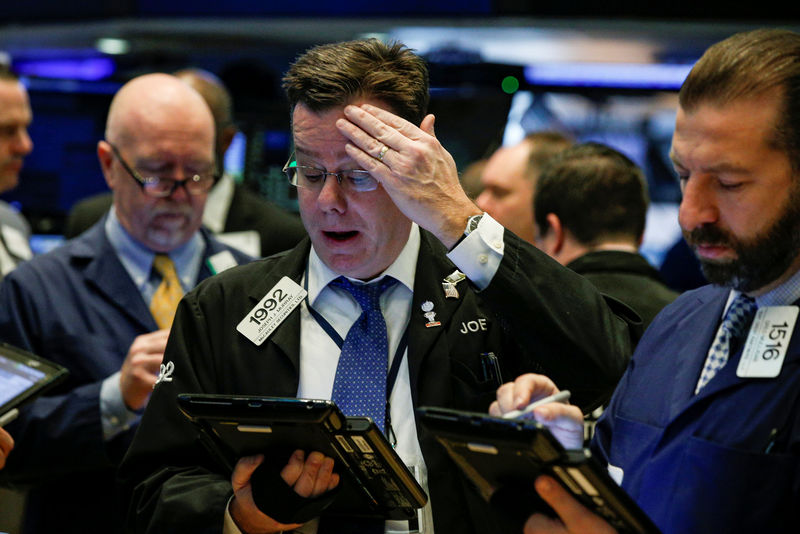* European shares fall, UBS results disappoint
* Wall Street lower after long holiday weekend
* IMF downgrades world growth forecasts again
By Chuck Mikolajczak
NEW YORK, Jan 22 (Reuters) - A gauge of world stock markets fell on Tuesday as concerns over global growth and trade gave investors incentive to look towards safe-haven assets such as the Japanese yen and government bonds.
Investors shunned risk assets like equities as the International Monetary Fund warned of a dimmer outlook on Monday, China confirmed its slowest growth rate in nearly 30 years, and as Brexit uncertainty continued to drag on sentiment. Wall Street, stocks took another step lower in the wake of a report from the Financial Times that the United States had turned down an offer of preparatory trade talks from China. Major indexes sold off and both the Dow and the S&P 500 fell below technical support levels at their 50-day moving averages. trading was volatile in the last hour of trade as White House economic adviser Larry Kudlow told CNBC the report was not true, causing a sharp move off the lows. so much in the background - trade, government shutdown, earnings season - you're going to have these big swings in the markets based on the latest data," said Paul Nolte, portfolio manager at Kingsview Asset Management in Chicago.
"(Investors) are getting more bearish and less optimistic about the outlook," Nolte added.
The Dow Jones Industrial Average .DJI fell 301.87 points, or 1.22 percent, to 24,404.48, the S&P 500 .SPX lost 37.81 points, or 1.42 percent, to 2,632.9 and the Nasdaq Composite .IXIC dropped 136.87 points, or 1.91 percent, to 7,020.36.
The benchmark S&P index suffered its biggest daily percentage fall since Jan. 3.
European shares fell for a second straight session, with Swiss bank UBS UBSG.S sinking over 3 percent on disappointing earnings, spelling continued trouble for European banks .SX7E which lost nearly 30 percent last year. its World Economic Outlook report, the IMF predicted the global economy would grow at 3.5 percent in 2019 and 3.6 percent in 2020, down 0.2 and 0.1 percentage point respectively from estimates in October. downgrade mainly reflected weakness in Europe, with Germany hurt by new car-emission rules, Italy under market pressure due to Rome's recent budget standoff with the European Union, and Britain's planned exit from the EU hanging over the bloc as well.
The pan-European STOXX 600 index .STOXX lost 0.36 percent and MSCI's gauge of stocks across the globe .MIWD00000PUS shed 1.08 percent.
The Japanese yen strengthened 0.24 percent versus the greenback to 109.42 per dollar JPY= . dollar index, which rose to its highest since Jan. 4 helped by safe-haven demand, erased gains after data showed U.S. home sales tumbled to their lowest in three years in December and house price increases slowed sharply, suggesting a further loss of momentum in the housing market. index .DXY , tracking the greenback against six major currencies, was flat, paring losses after the Kudlow statement.
The slowdown concerns also pushed U.S. Treasury yields lower as investors shifted some cash back into the bond market. Benchmark 10-year notes US10YT=RR last rose 10/32 in price to yield 2.7463 percent, from 2.782 percent late on Friday. crude CLcv1 settled down 2.29 percent at $52.57 per barrel and Brent LCOcv1 was last at $61.50, down 1.98 percent. Global assets in 2018
http://tmsnrt.rs/2jvdmXl Global currencies vs. dollar
http://tmsnrt.rs/2egbfVh Bouncebackability
https://tmsnrt.rs/2RYxKky
^^^^^^^^^^^^^^^^^^^^^^^^^^^^^^^^^^^^^^^^^^^^^^^^^^^^^^^^^^^>
